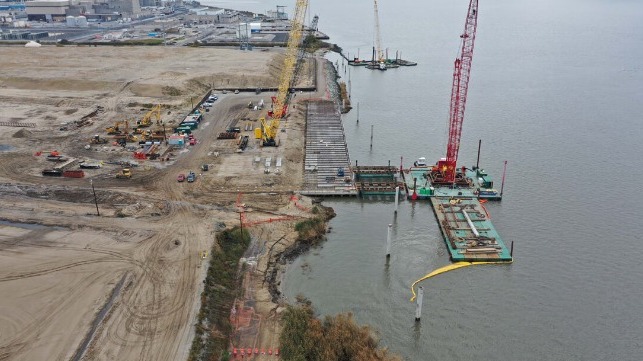Let's make a deal, Canada urges U.S. amid latest 'baseless' softwood lumber duties
The Canadian Press
Canada is urging the United States to make a good-faith effort at negotiating an end to the interminable bilateral dispute over softwood lumber.
International Trade Minister Mary Ng is making the overture after a fresh U.S. Commerce Department review maintained duties on softwood imports from Canada.
Ng says the duties, while modestly lower, remain an unfair, baseless and punitive measure that hurts the economy on both sides of the border.
She says a negotiated settlement is the only way the two countries will ever fully resolve the decades-old dispute.
Such a deal is unlikely: the U.S. has a fundamental problem with a regulatory regime in Canada that it says puts American producers at a disadvantage.
U.S. Trade Representative Katherine Tai has said the U.S. would be willing to negotiate, but only if Canada does away with its provincial stumpage fee system.
"An immediate negotiated solution to this long-standing trade issue is in the best interests of both our countries," Ng said in a statement.
"Canada is disappointed that the United States is not meaningfully engaging in discussions on a return to predictable cross-border trade in softwood lumber."
The Commerce Department established a combined "all others" duty rate of 7.99 per cent, only slightly less than the 8.59 per cent established after the last administrative review.
Ottawa, meanwhile, will keep up the fight through the dispute resolution tools in the U.S.-Mexico-Canada Agreement, the World Trade Organization and the courts in the U.S., Ng said.
"The only fair outcome would be for the United States to cease applying these baseless duties."
In Canada, lumber-producing provinces set so-called stumpage fees for timber harvested from Crown land — a system that U.S. producers, forced to pay market rates, say amounts to an unfair subsidy.
Federal officials in Ottawa have said Canada would never agree to implement such a fundamental change to the way a key Crown resource is managed before the two sides have even sat down.
This report by The Canadian Press was first published July 27, 2023.
Canfor Corp. reports $43.9M loss in second
quarter amid tough pulp, lumber conditions
The Canadian Press
Wildfires in Western Canada continue to disrupt Canfor Corp. operations as the company reported a loss of $43.9 million in the second quarter.
With new records set in both Alberta and B.C. for total hectares burned, the company said operational constraints are expected to continue well into the third quarter of 2023. The extreme conditions are also disrupting the company's access to fibre as well as harvest and hauling activities, Canfor said.
"While it is too early to determine the long-term fibre supply impacts, we have seen significant short-term disruptions to our operations, including a three-week curtailment of our facility in Fox Creek, Alberta in the second quarter," said Canfor president and CEO Donald Kayne on a call with analysts.
The company said it will assess the full extent of the fires' impact on its operations, including sustainable timber supplies and future harvesting plans, over the coming months.
The loss in the second quarter was down from the $373.8 million profit Canfor reported during the second quarter last year. However, it was an improvement from the first quarter, when Canfor reported a loss of $142 million.
Declining global pulp market conditions weighed heavily on its results in the second quarter, the company said in a press release Thursday, as did pressure on global lumber market fundamentals and pricing.
European and U.S. South operations were strong, helping partially offset weaker results from the company's western Canadian lumber business, Kayne said in the release.
Sales during the second quarter were $1.45 billion, down from $2.17 billion a year earlier.
The recent strike at B.C. ports will likely weigh on Canfor's results in the third quarter, said RBC analyst Paul Quinn in a note.
The strike "severely impacted" the supply chain for subsidiary Canfor Pulp Products Inc., said the company's president and CEO Kevin Edgson on the analyst call. Around 70 per cent of the company's pulp is shipped through the affected ports, and so the strike led to a weeklong curtailment at the Northwood pulp mill.
"We anticipate the supply chain challenges to persist through much of the third quarter," said Edgson.
Canfor Pulp reported a net loss of $28.4 million in the second quarter, down from a loss of $5.7 million a year earlier. Sales were $249.5 million, down from $288.9 million last year.
Overall, Canfor Corp.'s second-quarter earnings were better than expected, said Quinn, noting that the company expects lumber markets to benefit from a slight improvement in residential construction activity in the third quarter.
High interest rates are expected to keep existing home inventories at low levels of supply, Canfor said in its release.
"It is anticipated that new homebuilders will continue to offer concessions, however, in an attempt to potentially relieve some affordability pressures for prospective homeowners. As a result, residential construction activity is projected to experience a slight improvement through the third quarter of 2023 as the underlying demand for housing in North America remains."
This report by The Canadian Press was first published July 28, 2023.








